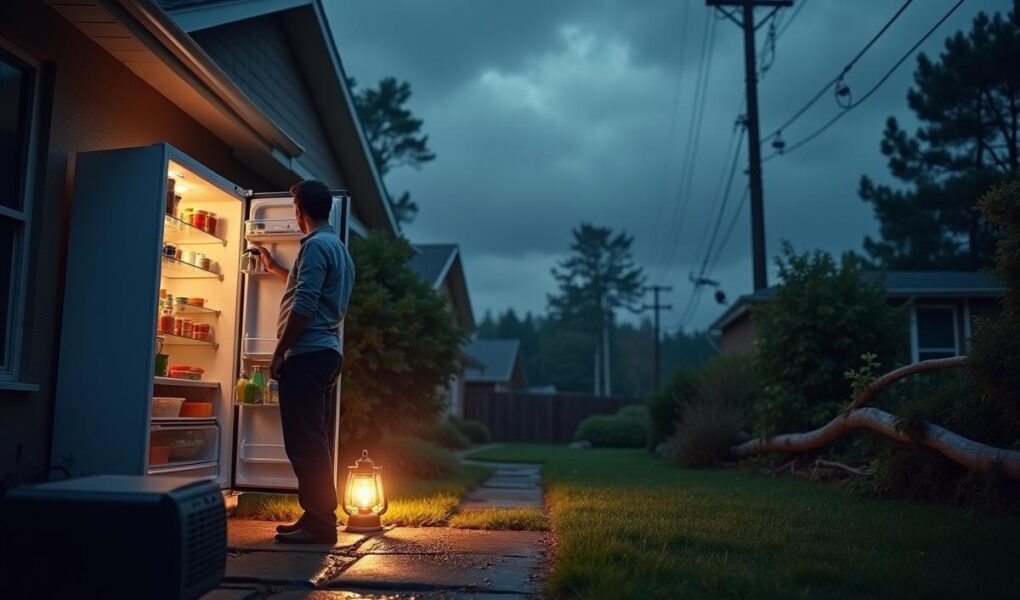For many households, understanding what power outages insurance covers can be challenging. You might wonder if your homeowner’s or renter’s policy will help pay for spoiled food, damaged electronics, or additional living expenses. Sometimes, these situations fall under specific coverage categories, but it can be tough to figure out what your plan really covers. This often leads people to ask questions about policy terms, deductible amounts, and whether extra endorsements are worth the investment.
Unexpected power failures can happen after severe storms, grid issues, or even planned maintenance by utility companies. Sometimes they last a few minutes, and other times they can drag on for days. When the lights go out, the refrigerator warms up and food can spoil. Sensitive devices could suffer electrical damage when the power flickers on and off. Knowing which scenarios your insurance might handle can remove some financial stress and even motivate you to prepare a solid backup plan.
How Most Homeowners Policies Address Outages
Many standard policies include coverage for certain losses tied to electrical failures. In some cases, if food spoilage happens due to an outage caused by a covered peril, you could qualify for limited reimbursement. However, not every event qualifies. Insurers pay close attention to the circumstances surrounding each claim, which is why you need to read the fine print of your homeowner’s policy.
When a storm causes a tree to knock down power lines in your neighborhood, the damage might be viewed differently from a blackout that hits your entire region. The source of the outage matters. If it is labeled under a named peril like wind, lightning, or a fallen object, homeowners policies frequently step in. On the other hand, if the cause stems from a utility company’s local transformer failing from old age, your insurance might not be so quick to offer help.
Food Spoilage Compensation
One of the most common concerns is who pays for the groceries you have to toss out. Some homeowners policies allow you to claim the value of food lost in a short-term outage. The amount could hinge on your deductible and whether your coverage includes an extension for refrigerated items. While standard reimbursement may be modest, it often takes the sting out of throwing away a well-stocked fridge.
Keep in mind, not all insurers extend this benefit. Some people add an endorsement to their policy that specifically addresses food loss, which can be especially useful in areas prone to frequent outages. If you live somewhere with a volatile grid, it might be worth a closer look at any optional riders or endorsements that strengthen your food spoilage protection.
Dwelling and Personal Property Coverage
Beyond spoiled groceries, potential damage to your appliances or electronics can be another big expense. Power surges can disrupt your laptop, gaming console, or TV. Some policies classify these items under personal property coverage, but the reimbursement depends on the cause of loss. If your insurer decides the problem began off-premises like a failing utility line compensation might be limited or excluded.
When the structural parts of your house become damaged, your policy’s dwelling coverage might handle repairs. Stormy weather could let water into your walls or roof, creating a messy situation that leads to mold or rot. However, a purely internal power failure that simply leaves your home in the dark without structural damage might not earn you significant coverage. Carefully reading your policy can clarify how it treats electrical mishaps and whether endorsements are available to fill the gaps.
Electronics and Technology Claims
Today’s households run on a variety of devices. Laptops, gaming systems, and smart home accessories can all be at risk if the power fluctuates. Many insurers set specific limits on high-value tech items. If you rely heavily on expensive equipment for work or entertainment, it might be prudent to review whether you need additional endorsements or a separate personal articles floater.
Always check if your policy has a special limit for electronics. If your device collection is extensive, you might exceed your standard coverage limit in the event of a major surge or total loss. Talk to your agent about scheduling specific items or boosting your personal property coverage so that you’re not left dealing with large replacement costs on your own.
Business-Related Losses and Extra Coverage
For those running a small business from home, an outage can halt your productivity, which may lead to lost income. Standard homeowners policies typically don’t cover that type of business interruption. You might also find that specialized equipment used for your home-based enterprise isn’t fully protected under personal property coverage. If you store merchandise or expensive devices on your property for commercial purposes, you’ll need a separate business policy or rider.
Some business insurance coverage options include a provision for lost income when there’s a direct physical loss to your property. Still, if the outage happens off-site and damages the local power grid, your claim might be denied without extra coverage for off-premises utility failure. Always confirm which triggers are recognized before depending on your policy to make up for lost revenue.
Business Interruption Endorsements
A modest endorsement could safeguard entrepreneurial dreams when everyday operations get disrupted. If you rely on electricity to keep your manufacturing process flowing or to power critical servers, securing an endorsement that covers off-premises utility interruptions might be a game-changer. It’s not automatic in most policies, so this usually requires careful coordination with your insurer.
For instance, a gourmet caterer with a walk-in freezer might face huge losses if a blackout cuts off cooling for days. Having a custom endorsement for extended power outages can save you from hefty financial hits. Be sure to do a cost-benefit analysis to see if these added protections align with your unique risk profile.
Situations That Often Aren’t Covered
Some policy gaps may take people by surprise. If a government entity shuts off power as a precaution, that circumstance might not be covered. Insurance tends to focus on direct cause-and-effect scenarios, so preventive shutdowns might fall under exclusions. Similarly, wear and tear to wiring on your personal property or old connections in your neighborhood’s infrastructure aren’t typically the insurer’s responsibility.
Sometimes insurance companies see rolling blackouts or utility maintenance outages as issues unrelated to typical “sudden and accidental” loss triggers. If your car is damaged during a blackout because the garage door wouldn’t open and you attempted to force it, that might not fall neatly into your property coverage. It really highlights the need to prepare and consider backup solutions.
Wear and Tear vs. Sudden Damage
Many standard policies draw lines between gradual deterioration and sudden, accidental damage. If you’ve neglected your home’s wiring and that leads to frequent circuit failures, it won’t be a covered event. On the other hand, if lightning strikes the power line and fries your circuit breaker, that scenario is more likely to meet the sudden-damage criteria.
Keep your home in good shape, update your electrical systems, and follow safety protocols. This helps not only reduce the risk of outages but also bolsters any eventual claims. Insurers look more favorably on properties maintained according to building codes and industry standards.
Filing a Claim After a Blackout
When you feel that your policy covers the aftermath of an outage, you’ll want to document the damage. This can include taking pictures of spoiled food, damaged electronics, or any structural harm. Some insurers may request receipts or an itemized list of each lost product. Although it might be tempting to toss everything right away, having proof of your losses can expedite any reimbursement.
Timing also matters. Promptly notify your agent and keep your policy information close at hand. If your deductible is higher than the cost of your claim, filing might not make sense. However, if the financial loss is significant, the paperwork may be well worth the effort.
Maintaining Good Communication
Staying in touch with your insurer can prevent delays. Email or call as soon as you can and provide clear answers to any questions. If they require an adjuster to come out, schedule the visit promptly. That face-to-face or virtual inspection helps clarify the scope of damage and speeds up the settlement process.
Providing detailed records of repair estimates can help support your claim. If you hire a licensed electrician to replace fried circuits or fix wiring, keep a copy of the invoice. Your insurance company may need evidence beyond your own photos, so any documentation from a third-party professional can be valuable.
Finding the Right Coverage for Your Needs
Before the next blackout hits, it pays to evaluate whether your existing policy is strong enough. Ask your insurer about specific endorsements or riders that address food spoilage, power surge damage, or business interruption. Costs can be moderate, and in regions with unreliable grids, that peace of mind may be worth every cent. Some people bundle endorsements with other coverage, ensuring they’re fully prepared for multiple risks.
You might also consider a backup generator if you live in a storm-prone environment or face frequent outages. Although a generator won’t solve every insurance issue, it can serve as a practical way to keep vital appliances running during a prolonged blackout. Combining some home upgrades with robust coverage options might be the best way to safeguard your property and budget.
Balancing Policy Limits and Deductibles
Every policy has its own cap on reimbursements, plus a deductible amount you must meet before coverage applies. Balancing a higher deductible with lower premiums might look appealing, but consider how that affects your readiness for outages. If a downed line leaves you in the dark for days, you don’t want to shoulder most of the repair or replacement costs out of pocket.
Meanwhile, too low of a deductible could mean monthly premiums that strain your budget. Aim for a middle ground that protects you from big expenses while remaining manageable in cost. Periodically reassess your coverage as market conditions change or if you’ve upgraded your home’s technology. A more valuable home means it’s wise to revisit insurance options to stay aligned with your risk profile.
Risk Management Beyond Insurance
While you can’t control the utility company, you can take steps to prepare your home. Surge protectors, uninterruptible power supplies (UPS), and regular wiring inspections all reduce the risk of catastrophic damage. Stocking up on shelf-stable food, installing battery-powered lanterns, and securing a portable generator can help you ride out shorter blackouts without stress.
Insurance comes into play when those protective measures aren’t enough, or when unavoidable damage happens. Yet prevention and preparedness often save more in the long run. By blending risk management strategies with careful coverage choices, you’ll stand a better chance at weathering any outage that comes your way.




